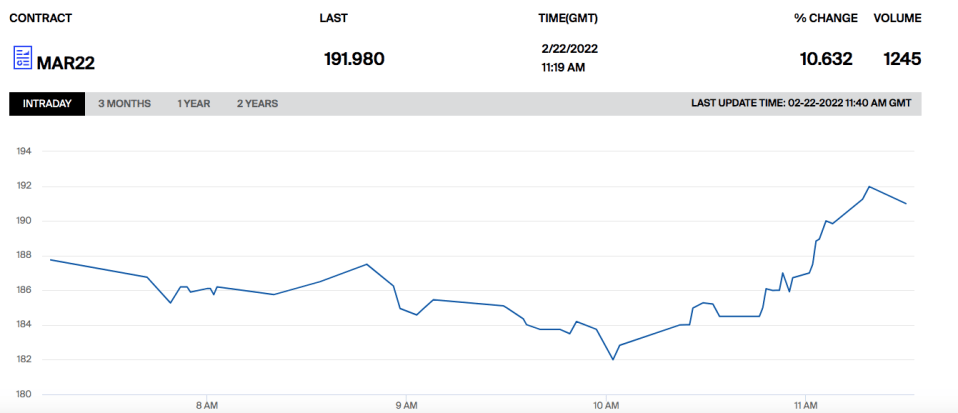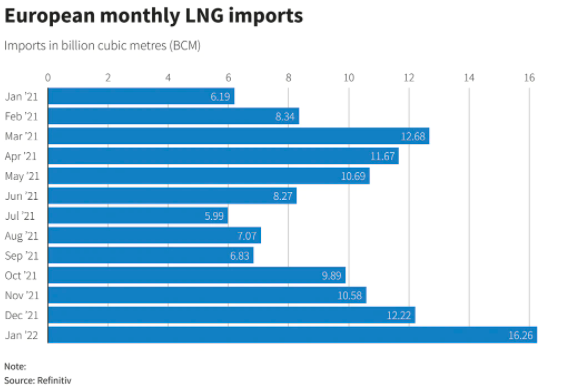Germany suspends Nord Stream 2 pipeline as Russian troops push into Ukraine

German chancellor Olaf Scholz has stepped in to halt the approval process of the controversial Nord Stream 2 pipeline.
He has withdrawn a key document needed for its certification, pulling the plug on Russian hopes of the project being green-lit in Germany this year.
Scholz has reassessed the pipeline following Russian President Vladimir Putin’s decision to recognise the independence of rebel-backed states in Ukraine, and order Russian troops into Luhansk and Donetsk.
He explained: “The situation is now different.”
The £8.4bn pipeline, which is owned by Kremlin-backed gas giant Gazprom, has already been constructed but needs to be approved by both EU and German regulators.

This process had already been put on hold by the EU Commission amid compliance concerns, while it has also faced delays from the Bundesnetzagentur over governance issues, with a final decision pushed back to the summer.
If it had been approved, Nord Stream 2 would have doubled natural gas exports between Russia and Germany, providing 55bn cubic meters of supplies every year.
Scholz’s suspension of the pipeline is not especially surprising, with US President Joe Biden previously warning the pipeline would not be approved if Russia instigated conflict in Ukraine.
Austrian chancellor Karl Nehammer also suggested yesterday that Nord Stream 2 would be included in the EU’s package of sanctions prepared against Russia if it invades Ukraine.
Ole Hansen, head of commodity strategy at Saxo Bank, told City A.M. that Germany’s decision to shelve the pipeline was a risky one.
He said: “Nord Stream 2 is just one part of a major sanctions puzzle, and one that will probably hurt Germany more than Russia, especially after Merkel’s ill-timed decision to phase out nuclear power without having a plan B besides wind mills and increased gas deliveries from Russia. Overall, a delay to Nord Stream 2 is likely to keep gas prices elevated throughout summer and unfortunately into next winter as well.”
Gas prices soar amid the looming prospect of sanctions
The Kremlin’s decision to intervene in Ukraine has been widely condemned by the West – with the UK, US and EU all warning of imminent sanctions against Russia.
Following Putin’s decision yesterday, gas prices have rocketed ten per cent on both European and UK benchmarks, amid renewed fears of shortening supplies across the continent.
Any measures against Russia likely to result in retaliation from Putin – with the Kremlin previously warning it was prepared to re-route gas and oil from European markets.
While the continent has topped up its LNG capacity over the past few months, courtesy of US imports, the continent’s natural gas flows remain at historically low levels.
EU Commission President Ursula von der Leyen has been bullish about supplies, arguing that the EU could hold out against partial disruption, but analysis published by investment bank Stifel and think tank Bruegel suggest the trading bloc would struggle with anything beyond a short-term supply shock.

LNG supplies require re-gasification, which is a lengthy process of turning the stocks into usable gas – with the EU probably having to race against time to convert the energy source before new emergency arrivals if the crisis escalates.
Europe relies on Russia for around 40 per cent of its natural gas, and is also suffering from its second biggest importer Norway, reporting declines in output.
According to preliminary data from the Norwegian Petroleum Directorate (NPD), oil and gas output in January fell from the previous month.
Crude oil output dropped to 1.74m barrels per day (bpd) in January from 1.85 million bpd in December, lagging a forecast of 1.78m bpd.
Natural gas production in January also fell to 10.6bn cubic metres (bcm) from 11 bcm a month ago, although this was above an official forecast of 9.9 bcm.
There has been a drift in the European consensus on dealing with Russia – with Italian President Mario Draghi publicly speaking out against including energy sanctions in any response from the EU.
He has been invited for talks with Putin to discuss a new gas deal between both countries.
Meanwhile, Germany’s economy minister Robert Habeck has said Germany must introduce regulation that commits its privately operated gas storage facility to have full capacity before winter to avoid the kind of energy crunch gripping the country,